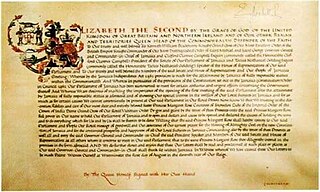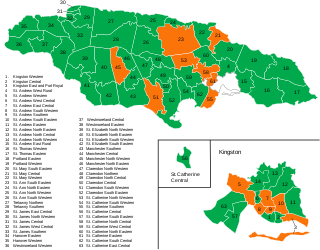
The Caribbean Island of Jamaica was initially inhabited in approximately 600 AD or 650 AD by the Redware people, often associated with redware pottery. By roughly 800 AD, a second wave of inhabitance occurred by the Arawak tribes, including the Tainos, prior to the arrival of Columbus in 1494. Early inhabitants of Jamaica named the land "Xaymaca", meaning "land of wood and water". The Spanish enslaved the Arawak, who were ravaged further by diseases that the Spanish brought with them. Early historians believe that by 1602, the Arawak-speaking Taino tribes were extinct. However, some of the Taino escaped into the forested mountains of the interior, where they mixed with runaway African slaves, and survived free from first Spanish, and then English, rule.

Michael Norman Manley was a Jamaican politician who served as the fourth Prime Minister of Jamaica from 1972 to 1980 and from 1989 to 1992. Manley championed a democratic socialist program, and has been described as a populist. He remains one of Jamaica's most popular prime ministers.

The People's National Party (PNP) is a social-democratic political party in Jamaica, founded in 1938 by Norman Washington Manley who served as party president until his death in 1969. It holds 14 of the 63 seats in the House of Representatives, as 96 of the 227 local government divisions. The party is democratic socialist by constitution.
The Jamaica Labour Party is one of the two major political parties in Jamaica, the other being the People's National Party (PNP). While its name might suggest that it is a social democratic party, the JLP is actually a conservative party.

Edward Philip George Seaga was a Jamaican politician. He was the fifth Prime Minister of Jamaica, from 1980 to 1989, and the leader of the Jamaica Labour Party from 1974 to 2005. He served as leader of the opposition from 1974 to 1980, and again from 1989 until January 2005.

Orette Bruce Golding is a former Jamaican politician who served as eighth Prime Minister of Jamaica from 11 September 2007 to 23 October 2011. He is a member of the Jamaica Labour Party (JLP), which he led from 2005 to his resignation in 2011.
Jamaican posses, often referred to simply as posses, are a loose coalition of Jamaican gangs, based predominantly in Kingston, London, New York City and Toronto, first being involved in drugs and arms trafficking in the early 1980s. Jamaican posses have links to the main Jamaican political parties, the Jamaica Labour Party (JLP) and the People's National Party (PNP).
The Smile Jamaica Concert was a reggae concert held on 5 December 1976 at the National Heroes Park in Kingston, Jamaica, aimed at countering political violence. Bob Marley had agreed to perform, but, two days before the concert, he was shot in his home. He recovered and, with The Wailers, played a 90-minute set for the 80,000 people in attendance.
Claude Massop was the leader and strongman of the Phoenix Gang, later renamed the Shower Posse, belonging to Tivoli Gardens, Wellington Street, Rema, Denham Town and the surrounding areas of West Kingston, Jamaica.

Christopher Michael Coke, also known as Dudus, is a convicted Jamaican drug lord and the leader of the Shower Posse, a violent drug gang started by his father Lester Coke in Jamaica, which exported "large quantities" of marijuana and cocaine into the United States.
The 2010 Kingston unrest, dubbed locally the Tivoli Incursion, was an armed conflict between Jamaica's military and police forces in the country's capital Kingston, and the Shower Posse drug cartel. The conflict began on 23 May 2010 as security forces began searching for Christopher "Dudus" Coke, a major drug lord, after the United States requested his extradition, and the leader of the criminal gang that attacked several police stations. The violence, which largely took place over 24–25 May, killed at least 73 civilians and wounded at least 35 others. Four soldiers and police were also killed and more than 500 arrests were made, as Jamaican police and soldiers fought gunmen in the Tivoli Gardens district of Kingston.
Tivoli Gardens is a neighbourhood in Kingston, Jamaica. Developed as a renewal project between 1963 and 1965, the neighbourhood continued to suffer from poverty. By the late twentieth century it had become a center of drug trafficking activity and social unrest. Repeated confrontations took place between law enforcement and gunmen in the neighbourhood in 1997, 2001, 2005, 2008, and 2010.
Shower Posse is a Jamaican gang, started by Lester Lloyd Coke, which is involved in drug and arms smuggling. Its home is in Tivoli Gardens in Jamaica. It has several North American branches. The North American branches were first founded by Vivian Blake in the Canadian city of Toronto, Ontario. The gang operates in expatriate Jamaican communities in the US states of New York, New Jersey, Pennsylvania, and the city of Miami, Florida.
Sharon Hay-Webster is a Jamaican politician. She was a member of the House of Representatives of the Parliament of Jamaica from 1997 to 2012, representing the People's National Party. She came to international attention after the 2004 Haitian coup d'état, when she escorted Jean-Bertrand Aristide from his temporary exile in the Central African Republic to Jamaica at the invitation of then-Prime Minister of Jamaica P. J. Patterson.

The Colony of Jamaica gained independence from the United Kingdom on 6 August 1962. In Jamaica, this date is celebrated as Independence Day, a national holiday.

Norman Washington Manley was a Jamaican statesman who served as the first and only Premier of Jamaica. A Rhodes Scholar, Manley became one of Jamaica's leading lawyers in the 1920s. Manley was an advocate of universal suffrage, which was granted by the British colonial government to the colony in 1944.

A Brief History of Seven Killings is the third novel by Jamaican author Marlon James. It was published in 2014 by Riverhead Books. The novel spans several decades and explores the attempted assassination of Bob Marley in Jamaica in 1976 and its aftermath, through the crack wars in New York City in the 1980s and a changed Jamaica in the 1990s.

General elections were held in Jamaica on Thursday, 3 September 2020 to elect 63 members of Parliament. As the constitution stipulates a five-year parliamentary term, the next elections were not expected until between 25 February and 10 June 2021. However, Prime Minister Andrew Holness called early elections to ensure a united response to the ongoing COVID-19 pandemic. On the advice of Holness, Governor General Patrick Allen dissolved Parliament on 13 August 2020.
On December 3, 1976, seven armed men raided the residence of reggae musician Bob Marley in Kingston, Jamaica, two days before Marley was to stage a concert in an attempt to quell recent violence. Politicians from across the political spectrum hoped to capitalize on Marley's support. While Marley remained neutral, many viewed him as tacitly supporting the prime minister Michael Manley and his democratic socialist People's National Party (PNP). Marley and three others were shot, but all survived.
Lester Lloyd Coke, commonly known as Jim Brown, was a Jamaican drug lord and the founder of the Shower Posse, a gang based out of the Tivoli Gardens garrison community in West Kingston. Coke was identified by the Netflix documentary ReMastered: Who Shot the Sheriff as present and a party to the shooting of Bob Marley on 3 December 1976.









